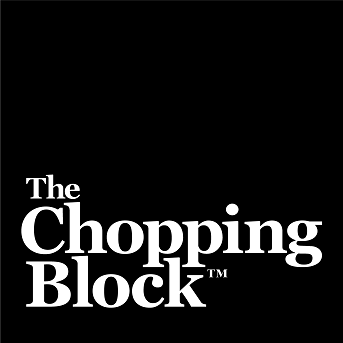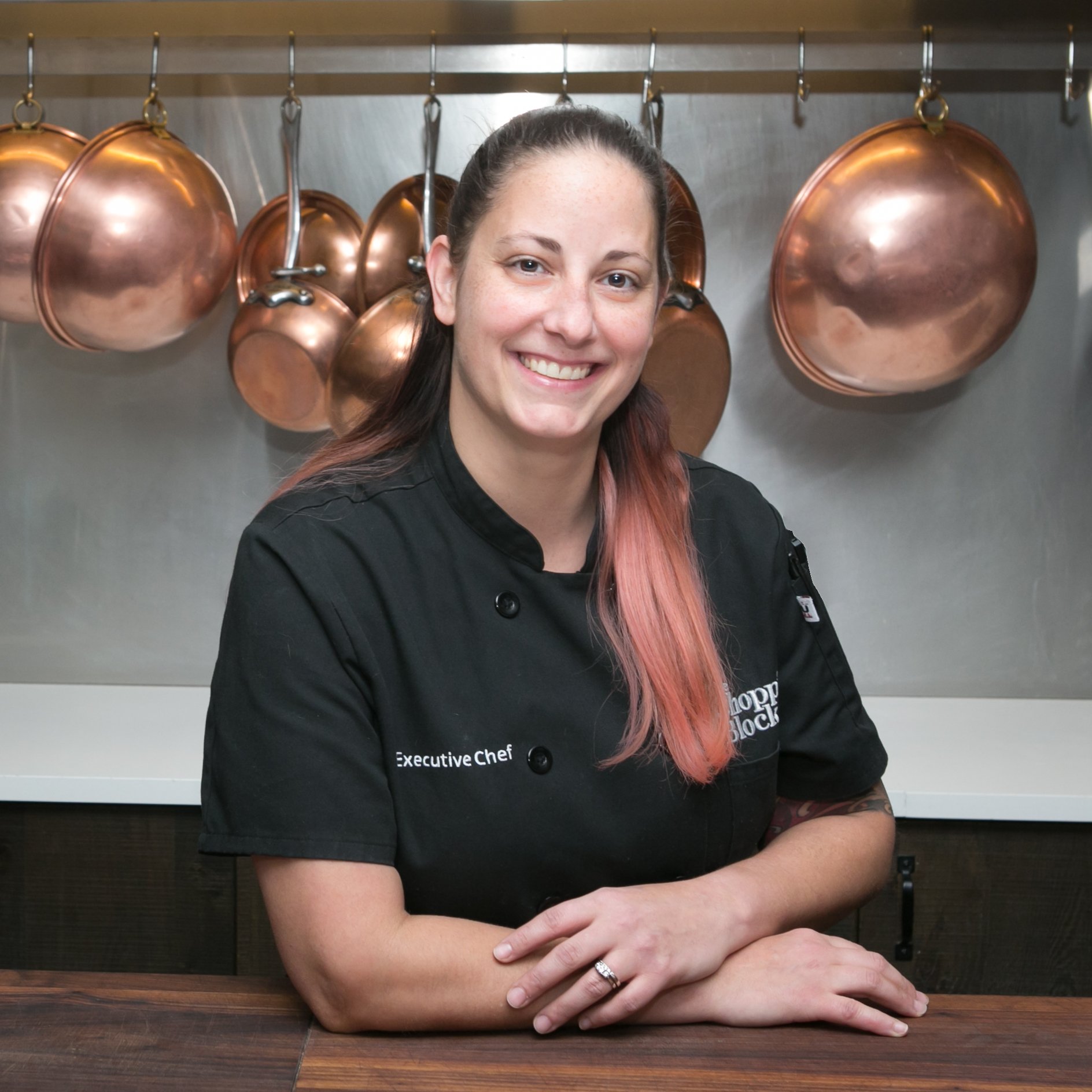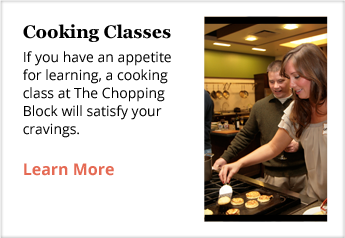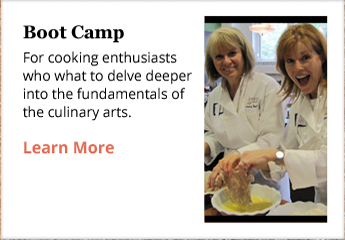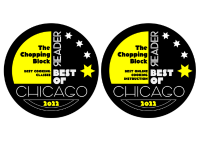There have been numerous culinary techniques I have learned throughout my career that have made me the chef I am today. I always say that as a cook you need to understand all of the aspects of cooking techniques or “rules” of how to cook ingredients properly in order to know how to “break the rules.” What I mean by that is there are only so many different ways to cook food - searing, roasting, poaching, boiling, sautéing, braising - these are all very basic cooking methods. Once you understand these then you can get to a place of not needing recipes or being able to take a recipe and get creative to make it your own, or knowing when a recipe just isn’t right.
What I love about teaching is being able to offer tips, tricks and hacks that I didn’t learn in culinary school but have amassed on my own working with really awesome chefs and a lot of trial and error. You may have heard about some of these, but I want to share some things that I have learned along the way and hopefully you find this list of my favorite tips helpful!
If you have ever taken one of my classes (If not? What are you waiting for?), you may have heard me say some of these key catchphrases and acronyms. I joke that these will probably be etched on my tombstone, but they have become a staple in my dialogue of cooking because I do think they are very important. There is always so much I discuss in my classes that go beyond just a recipe or technique. That is why I love teaching Culinary Boot Camp because we really dive deep into all subject matters.
Top Chef Hacks for Home Cooks
1. ABT: Always be tasting! Tasting is one of the most important parts of the cooking journey. A home cook should be tasting throughout the cooking process, not just at the end.
2. ABC: Always be cleaning! Cleaning as you go is very important because, let’s be honest, nobody wants to clean after they worked so hard to cook a meal.
3. Stirring is Not Cooking: It is human nature to want to stand over a pot and continually stir but realistically the more you stir, the more you are just cooling down the pot. If the food isn’t in constant contact with the hot pan you will never achieve caramelization when needed.
4. Don’t Forget to Season: Salt is very necessary in order to bring out all of the flavors of the food and make things taste good. A general rule of thumb that I follow is to season from high up above your food and evenly distribute that salt so you can see it all over the surface area of your food. Kosher salt is the salt that I use for about 90% of my cooking and seasoning.
5. Mise en Place: The most important phrase to learn translates to “Everything in its place.” I can’t stress enough how much more efficient you will become in the kitchen if you take the time to prep and organize your ingredients before starting to cook.
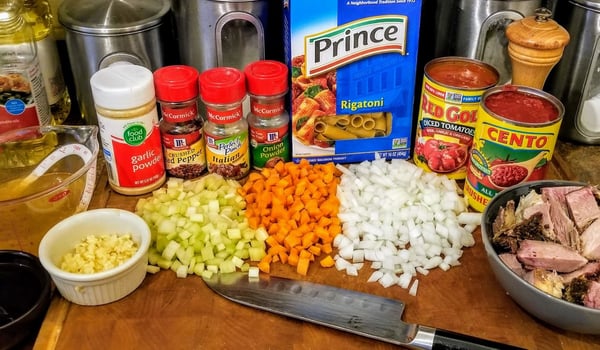 6. Garlic: To get the smell of garlic off your hands or cutting board, you can use stainless steel. I have this stainless steel fish that I “wash” my hands with and the garlic smell disappears!
6. Garlic: To get the smell of garlic off your hands or cutting board, you can use stainless steel. I have this stainless steel fish that I “wash” my hands with and the garlic smell disappears!
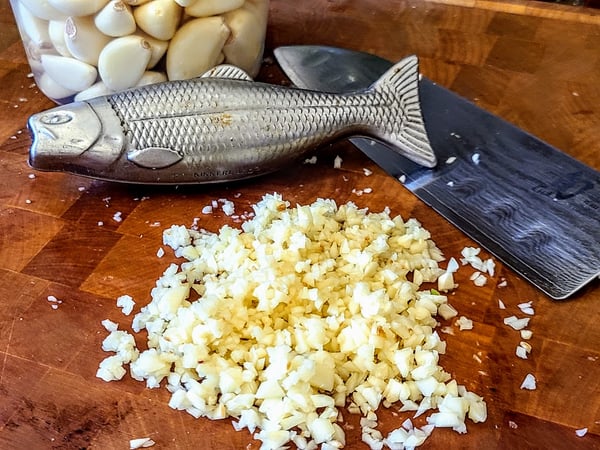 7. Stop Overworking Dough: In order to achieve flaky layers in biscuits, pie dough, or scones it is very important to leave the butter in “pea” sized pieces throughout the dough. The dough should be just lightly patted together and not overly kneaded together which can result in tough and dense final products. Also, anything that is baked and has butter in it will always bake better when cold.
7. Stop Overworking Dough: In order to achieve flaky layers in biscuits, pie dough, or scones it is very important to leave the butter in “pea” sized pieces throughout the dough. The dough should be just lightly patted together and not overly kneaded together which can result in tough and dense final products. Also, anything that is baked and has butter in it will always bake better when cold.
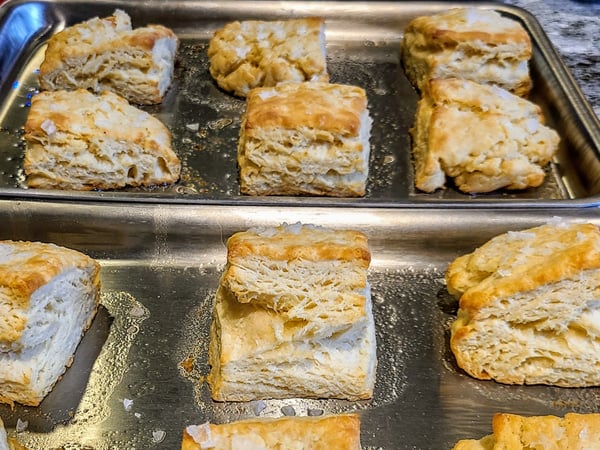 8. Citrus Juicers: First, always place the cut side down so the juicer can invert the half and get the most juice out. My second tip is to double the halves in the juicer to squeeze even more juice out and don’t forget to tilt it to the side, sometimes juice is hiding in the layers.
8. Citrus Juicers: First, always place the cut side down so the juicer can invert the half and get the most juice out. My second tip is to double the halves in the juicer to squeeze even more juice out and don’t forget to tilt it to the side, sometimes juice is hiding in the layers.
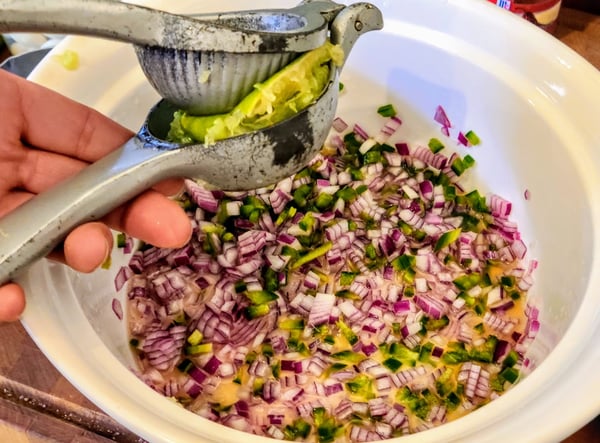 9. Acid: Besides salt, acidic ingredients like citrus or vinegar will enhance your flavors exponentially. When building a salad or salsa or you just want to take the bite out of raw onions, I always soak my veggies in acid and salt first. Then to lock in that flavor when done, I finish with oil to coat. Also, if you find yourself using a lot of salt during a cooking process but you still taste it and feel like it needs something, try adding in a splash of your favorite acid of choice, this will help brighten up your dish.
9. Acid: Besides salt, acidic ingredients like citrus or vinegar will enhance your flavors exponentially. When building a salad or salsa or you just want to take the bite out of raw onions, I always soak my veggies in acid and salt first. Then to lock in that flavor when done, I finish with oil to coat. Also, if you find yourself using a lot of salt during a cooking process but you still taste it and feel like it needs something, try adding in a splash of your favorite acid of choice, this will help brighten up your dish.
10. Grains: Toast your grains before cooking them! I like to do a lot at a time so I bake my grains (farro, pictured below, or quinoa, amaranth, barley, etc.) in a 350° oven for about 10 minutes or until they become fragrant. This will intensify their flavor and give your dish more depth. You can also do this in the pot you plan on cooking your grains in before adding the liquid and simmering.
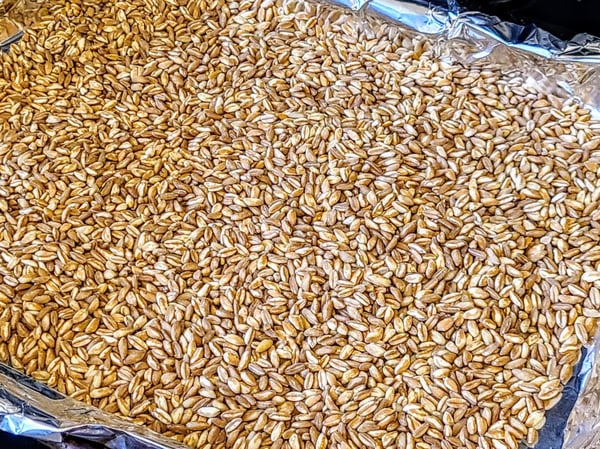 11. Waste: I hate food waste, so I always try to utilize everything I can or it goes into my compost bin. I save vegetable scraps for stock or other sauces. I freeze everything until I have enough to use!
11. Waste: I hate food waste, so I always try to utilize everything I can or it goes into my compost bin. I save vegetable scraps for stock or other sauces. I freeze everything until I have enough to use!
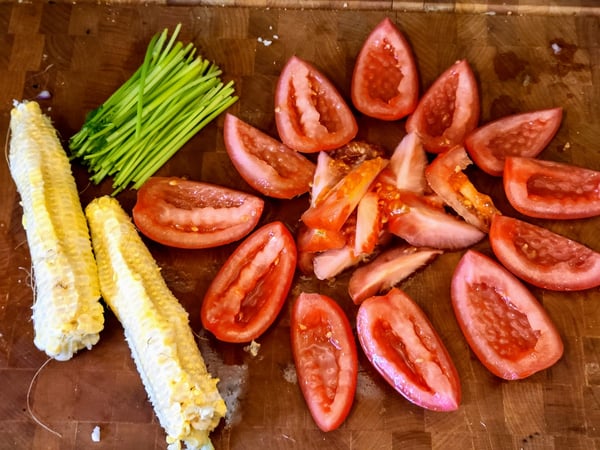 12. Roasting Peppers: If you haven’t roasted peppers over an open flame, you are truly missing out! First, get them charred on all sides then wrap them up in a zippered plastic bag or a bowl with plastic wrap. Once cool, you can peel off as much of the skin as possible (don’t worry if a little is left on) and cut them up however you like to be used in salads, pizza, pasta or whatever you desire. You can do a bunch and they will last in your fridge for a week or so. I also have a really great chef hack for cutting raw peppers; but for that, you will have to take our Knife Skills class!
12. Roasting Peppers: If you haven’t roasted peppers over an open flame, you are truly missing out! First, get them charred on all sides then wrap them up in a zippered plastic bag or a bowl with plastic wrap. Once cool, you can peel off as much of the skin as possible (don’t worry if a little is left on) and cut them up however you like to be used in salads, pizza, pasta or whatever you desire. You can do a bunch and they will last in your fridge for a week or so. I also have a really great chef hack for cutting raw peppers; but for that, you will have to take our Knife Skills class!
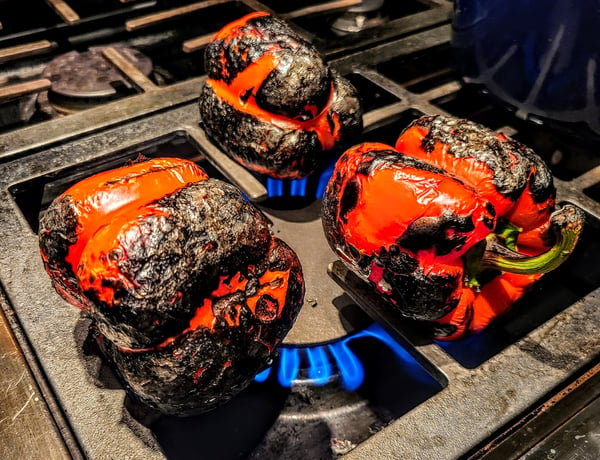 13. Spatchcock Poultry: If you have never heard the term spatchcock, all it means is to cut the backbone out of your poultry. This cuts down on overall cooking time, allows for more surface area to brown and crisp up, and your bird will cook more evenly.
13. Spatchcock Poultry: If you have never heard the term spatchcock, all it means is to cut the backbone out of your poultry. This cuts down on overall cooking time, allows for more surface area to brown and crisp up, and your bird will cook more evenly.
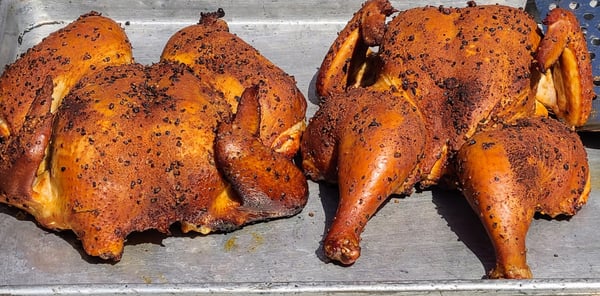 14. Ginger: I love peeling my ginger with a spoon. I find that I don’t lose as much flesh that way. Ginger can be quite fibrous so I prefer actually mincing it with a knife over using a grater or a Microplane. In my opinion, this keep keeps the flesh nice and juicy so the flavor is more pronounced. To keep your ginger fresher longer; try keeping pieces in a Ziploc bag in the freezer and just pull out what you need and peel from frozen.
14. Ginger: I love peeling my ginger with a spoon. I find that I don’t lose as much flesh that way. Ginger can be quite fibrous so I prefer actually mincing it with a knife over using a grater or a Microplane. In my opinion, this keep keeps the flesh nice and juicy so the flavor is more pronounced. To keep your ginger fresher longer; try keeping pieces in a Ziploc bag in the freezer and just pull out what you need and peel from frozen.
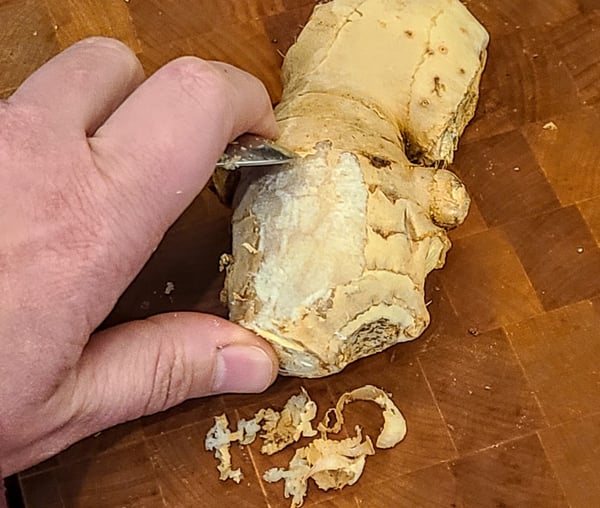 There are so many more random food thoughts that I can provide you. I mean this list only scratches the surface of tips and tricks up my sleeve, but I would love to learn from you all too! For this week’s #tcbcooking challenge in our private Facebook group, I want to hear all about your chef hacks! If you are not a member, join our group.
There are so many more random food thoughts that I can provide you. I mean this list only scratches the surface of tips and tricks up my sleeve, but I would love to learn from you all too! For this week’s #tcbcooking challenge in our private Facebook group, I want to hear all about your chef hacks! If you are not a member, join our group.
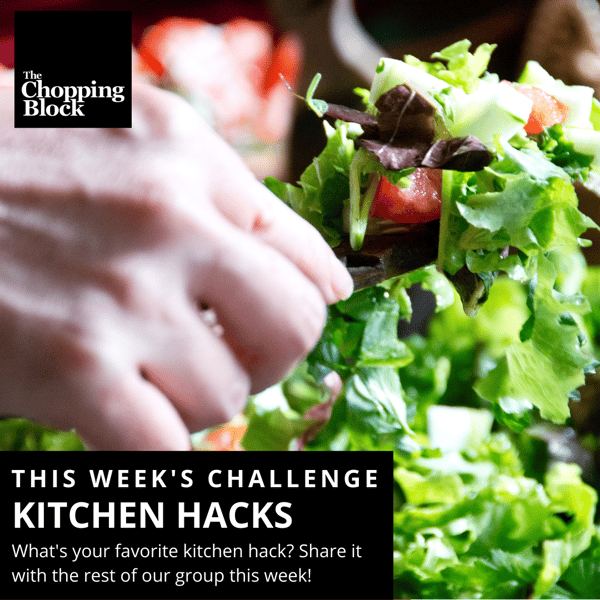 Join our Facebook Group
Join our Facebook Group
All of our classes, whether virtual or in person, will always provide some great knowledge for you to take on your culinary journey, so I hope to see you in class soon.
